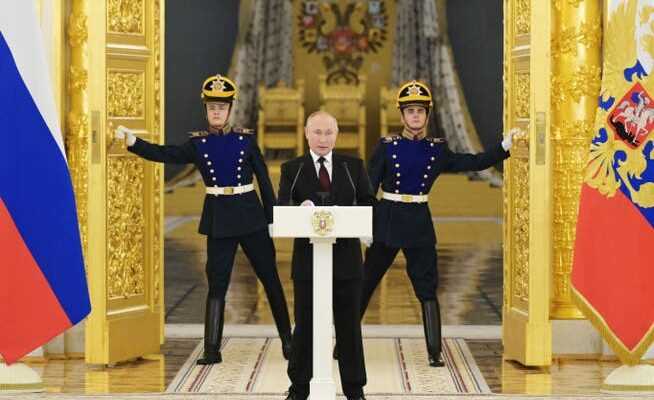Since the beginning of the war in Ukraine, the EU and the US have expelled Russian diplomats in unprecedented numbers, and Moscow has also been banned from various international forums. A diplomatic solution to the war is also uncertain.
On the international stage, Vladimir Putin has lost a great deal of influence.
The visit of Austrian Chancellor Karl Nehammer to Moscow on Monday cannot hide the fact that diplomatic relations between Russia and the rest of the world have hit rock bottom since the invasion of Ukraine. The US and EU have expelled more than 400 Russian embassy officials since February 24. The most recent example is Croatia: the EU and NATO member sent 16 diplomats and eight other employees of the Russian embassy back to their home country on Monday.
But the diplomatic crisis goes beyond the expulsions: Russia is also being isolated within the United Nations, and peace negotiations with representatives of Ukraine have been suspended for two weeks.
Masses of Russian diplomats expelled
German Foreign Minister Annalena Baerbock chose clear words when she expelled forty Russian embassy employees on April 4. In Germany, they worked daily “against our freedom” and “against the cohesion of our society”. Like other European countries, Germany cited two main reasons for the expulsion: the Bucha massacre and the alleged espionage activities of Russian embassy employees. Lithuania even went a step further and asked the Russian ambassador to leave the country.
The USA and Bulgaria made the start just a few days after the Russian invasion. Poland followed on March 23 with the expulsion of 45 embassy employees. A next round started in early April as evidence of Russian war crimes mounted. Switzerland has so far refrained from expelling Russian diplomats. Federal President Ignazio Cassis said on Thursday that such a measure must be taken for a security purpose and not as a sanction.
Moscow mostly responds to the expulsions in the same way: Last Friday, Russia also declared exactly 45 Polish embassy employees persona non grata, and the Russian government did similar things in other countries.
Russia is isolated in international organizations
Russian diplomats are also no longer welcome in various multilateral forums. Last Thursday, the UN General Assembly voted to suspend Russia’s membership of the Human Rights Council. Until then, Libya had been the only country excluded from the body. It is worth noting that Russia’s diplomatic crisis is also spreading to international forums, which are considered to be little political.
The Administrative Council of the International Labor Organization (ILO) suspended technical cooperation with Russia as early as March 22. At first, Russia lost its observer status at the European Organization for Nuclear Research (Cern), later the scientific cooperation with partners from Russia and Belarus was terminated. At the World Trade Organization (WTO), the EU and the US have excluded Russia from the developed countries’ talks group and are refusing to speak to Russian delegation officials.
Even in space, Russia could soon be on its own: The European Space Agency (ESA) has canceled a Mars mission with its Russian counterpart Roskosmos. For its part, Russia has threatened to end cooperation with NASA on the International Space Station if the US does not lift its sanctions.
Further peace negotiations are uncertain
The most important diplomatic meetings are currently taking place in Istanbul. Since the beginning of the war, Russian and Ukrainian delegations have met there to negotiate a peace agreement. After the last round of negotiations at the end of March, the Turkish mediators reported progress. But there have been no further meetings since then, and it is unclear when new negotiations between the warring parties will begin.
In a broadcast on Sunday Interview with the American television channel NBC Ukraine’s Foreign Minister Dmitro Kuleba said that considering Russia’s war crimes, it was extremely difficult even to think of sitting down with Russian officials. But in principle he was willing to talk: “If negotiations lead to me only preventing a massacre like in Bucha, I have to seize this opportunity.”
